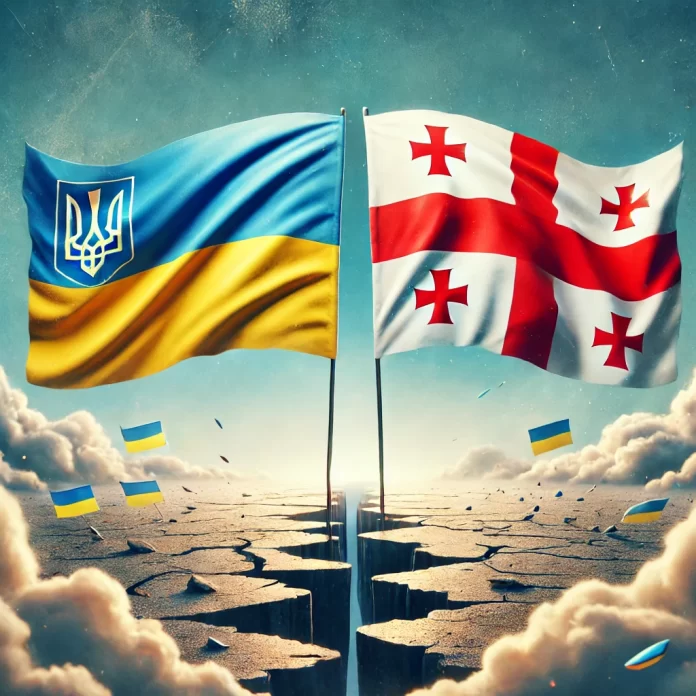Ukrainian President Volodymyr Zelensky has taken a firm stand against recent actions by the Georgian Government, announcing the introduction of sanctions in response to what he described as dangerous and unjust policies. During his evening address to the Ukrainian people, Zelensky expressed deep disappointment, accusing Georgia’s leaders of jeopardizing their nation’s independence by aligning themselves more closely with Russian interests.
Ukraine Condemns Georgian Government’s Actions
In his statement, Zelensky did not hold back, condemning the Georgian Government’s behavior as detrimental not only to Georgia but to the stability of the region as a whole. He remarked, “The situation in Georgia is not just a challenge for one nation or our region. The Georgian Government is steering the country into undeniable dependence on Russia.” It is shameful to see the steps they are taking against their own people.”
The Ukrainian president highlighted that Georgia’s leadership appears to be acting against the will and aspirations of its citizens. He further criticized the government for what he described as a betrayal of national interests, noting that Moscow’s open praise for the Georgian authorities leaves little room for doubt about their alignment. He added, “When Moscow commends the Georgian authorities, it becomes clear who they are truly serving in Tbilisi—and it is certainly not the people of Georgia.”
Sanctions and International Collaboration
Zelensky announced that Ukraine is actively preparing a legal and diplomatic response to the situation. He instructed relevant Ukrainian agencies to draft sanctions against those responsible for actions that, in his view, undermine Georgian democracy and stability. These measures are being developed in close coordination with European partners and other allies to ensure a unified stance.
The decision to impose sanctions comes against the backdrop of ongoing international concern over the Georgian Government’s handling of internal dissent and its relationship with Russia. For nearly a week, large-scale protests have gripped Georgia. These protests erupted after the government announced that negotiations to join the European Union would be postponed until 2028—a move seen by many as a setback to the country’s aspirations for European integration.
This delay has sparked outrage among Georgian citizens, who view EU membership as a pathway to economic growth, stronger democratic institutions, and reduced dependence on Russia. Many see the government’s actions as a betrayal of their aspirations for a future aligned with European values.
Zelensky’s sanctions announcement follows similar actions taken by other countries. For example, the Baltic states recently introduced sanctions targeting Georgian officials reportedly involved in suppressing protests. These measures, which include sanctions against former high-ranking officials, reflect a growing international consensus on the need to address what many see as authoritarian tendencies in the Georgian Government.
Protests Reflect Growing Public Frustration
The announcement of postponed EU negotiations has ignited widespread frustration among the Georgian population, who have long pushed for closer ties with Europe. The protests, which have continued for nearly a week, feature large crowds of citizens voicing their dissatisfaction with the government’s direction. Demonstrators argue that delaying EU membership talks is a step backward for Georgia, steering the country closer to Russian influence.
Many protesters see these actions as a deliberate attempt by the government to curtail the country’s progress toward European integration. The delay has been perceived as a sign that Georgia is succumbing to external pressure from Russia—a country that has historically sought to maintain influence in the region.
The demonstrations have been met with forceful responses in some instances, including violent crackdowns on protesters. This has drawn sharp criticism from human rights organizations and democratic governments around the world. Zelensky, in his address, emphasized solidarity with the Georgian people, commending their resilience and courage in standing up for their rights.
“The current Georgian Government is clearly acting against the interests of its own people,” Zelensky said, reaffirming Ukraine’s support for the aspirations of Georgian citizens. By introducing sanctions, Ukraine aims to make a bold statement against policies that threaten regional stability and democratic values.
The unfolding crisis in Georgia has become a focal point for international attention, with many viewing it as a critical moment for the region. The protests, the government’s response, and the international sanctions illustrate the growing divide between those pushing for European integration and those seen as aligning with Russian interests. As the situation continues to develop, the stakes remain high not just for Georgia but for the broader region.


